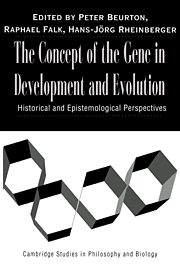Introduction
Published online by Cambridge University Press: 12 January 2010
Summary
Everybody knows about genes. One can read about them in the press. Often we are told that genes are selfish and help themselves rather than the bodies they are housed in. Genes play their role in the nature/nurture debate and in health care. Also, there is an urgent need to conserve the biodiversity around us for future generations that has, of course, to do with genes. There is a big science industry of genome sequencing that is an inventory-taking of all of man's (and other organisms') DNA. Darwin searched a lifetime in vain for the hereditary units, and indeed, genes are indispensable in modern Darwinian evolutionary theory. Early this century, genes were inferred from the Mendelian behavior of traits. The year 1953 marked a breakthrough when Watson and Crick disclosed the doublestranded helical structure of DNA. This suggested an elegant explanation of how genes could replicate themselves from one generation to the next but also serve the purpose of building an individual organism in each generation. Henceforth, the gene came to be viewed as a piece of DNA that coded for a protein or, more generally, a functional or structural product. Genes were seen as inviolable messages passed down the generations (save for occasional mutations) and as the ultimate causal factors lying behind development. Once, these findings were considered evidence for one of the most successful research strategies in the life sciences during the first half of the twentieth century.
Information
- Type
- Chapter
- Information
- The Concept of the Gene in Development and EvolutionHistorical and Epistemological Perspectives, pp. ix - xivPublisher: Cambridge University PressPrint publication year: 2000
